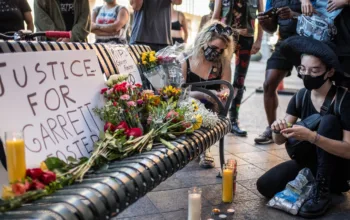Flying has gotten hellish. Consumers might finally get compensated.
Under a new rule from the Biden administration, passengers could soon get relief for one of the most frequently cited travel grievances.
The rule, which was announced in late April, would require airlines to provide automatic refunds for flight delays, an issue that’s been a major source of consumer frustration in recent years. That’s a big change from existing policies, which give airlines significant leeway in doling out these refunds and require travelers to push for them themselves.
This proposal is just the latest consumer protection policy from the Biden administration and part of the White House’s broader efforts to burnish these credentials ahead of the 2024 election this fall. While the White House has had legislative success, including the passage of bills that lower prescription drug prices and make substantial investments in infrastructure, communicating those wins can be tough because many of these proposals will take years to implement and be felt.
The airline refund rule, which will go into effect in October, offers an immediate example of how the administration is trying to address a commonly expressed grievance. It also comes as negative sentiment has grown toward the airline industry in the wake of a shocking Boeing plane incident in January and subsequent scrutiny of industry-wide quality control issues. All told, delays and cancellations have cost airlines $8.3 billion and consumers $16.7 billion on an annual basis.
Here’s what you need to know about how the rule works and why it’s happening in the first place.
How the rule works
The new rule, to be implemented by the Department of Transportation (DOT), requires airlines to provide refunds for both flight cancellations and “significant changes.” For the first time, the agency spells out what these changes entail. They include:
- If a domestic flight is delayed more than three hours
- If an international flight is delayed more than six hours
- If the location of the departure or arrival airport changes
- If more connections are added to a flight
- If passengers are downgraded to a different class or service than the one they paid for
These criteria set a common standard for all airlines, making the basis for such refunds clear for both travelers and companies.
The new rule also makes these refunds automatic. That means that consumers don’t have to file a claim with the airline, streamlining the process.
The policy requires refunds to be provided within seven business days to consumers who use a credit card, and within 20 calendar days to those who use other forms of payment. Travelers will only be eligible if they turn down an alternative flight option or other compensation, like a travel voucher. That means if a passenger still took a flight after it was delayed for four hours, for example, they would not be eligible for the refund.
The new rule also guarantees refunds of other fees in case wifi doesn’t work or if checked baggage does not arrive within 12 hours of a domestic flight landing, or within 15 to 30 hours of an international flight landing.
Automating refunds is an important part of this policy because it puts the onus of figuring out penalties on the airlines and not the consumer. One issue that consumer advocate Christopher Elliott previously highlighted in the Washington Post, for example, was that customers in Europe would have to wait months for refunds they were seeking because airlines would take their time processing claims. The way the White House rule is written attempts to prevent companies from dragging their feet and to make them take on the logistical burdens of this process.
A bipartisan group of Congress members, however, are trying to undercut this provision of the rule. In a new bill that reauthorizes funding for the Federal Aviation Administration, lawmakers have included language that would require consumers to file a claim before they could receive a refund, Skift reports. “You shouldn’t have to jump through hoops to get your money back,” Sen. Elizabeth Warren (D-MA) said in a statement in response to this measure. Warren and Sen. Josh Hawley (R-MO) have also filed an amendment to the FAA bill in an attempt to preserve the White House’s rule.
Biden is going in on consumer protection policies
The proposed rule is one of several consumer protection policies the White House has advanced in the last year.
It follows an FDA proposal that enabled hearing aids to be sold over the counter, likely reducing their cost, as well as a Consumer Financial Protection Bureau (CFPB) rule that reduces late fees for credit card payments. DOT also has another rulemaking in process that would eliminate additional fees for families trying to sit together on planes, the Federal Trade Commission is working on a rule to ban the use of hidden fees, and the CFPB is targeting bank overdraft fees as well.
Biden touted aspects of this push in his State of the Union address earlier this year in a bid to highlight his commitment to consumer protections.
The flight refund rule is intended to combat traveler discontent with the airline industry and the time and financial losses people face when they have to change their plans or reschedule travel. In a challenging election year, the choice to focus on such concerns allows the White House to point to key policies it’s delivered on and that people can feel directly in their daily lives.



